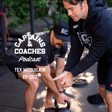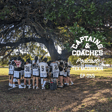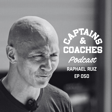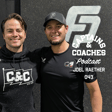Environment and Thriving: Fish Analogy
00:00:00
Speaker
yeah I believe environment always wins. At some point, a leader needs to reflect and look at themselves and what environment are you you putting people in. The fish are not sick. The water's dirty. If you put a healthy fish into an aquarium that is dirty water, they're going to get sick.
00:00:14
Speaker
But were they sick going into it or did the environment not set them up to thrive? So I think that it's the same thing with sports. As parents, it's our obligation to put our kid in a successful environment so that they could
Podcast Introduction
00:00:26
Speaker
thrive. Welcome to the captains and coaches podcast where we explore the art and science of leadership through the lens of athletics and beyond.
00:00:33
Speaker
I'm your host, Exel Coulkin coming to you from the lacrosse barn in Dallas, Texas for a very special episode.
Guest Introduction: Coach Justin Cavanaugh
00:00:40
Speaker
I'm joined by coach Justin Cavanaugh, a high performance leadership expert who's been mentoring athletes and coaches for nearly 20 years.
00:00:49
Speaker
I've known Coach Kav since the start of my coaching career way back in 2009 and continue to work closely with him his business mastermind, The Coach's Room.
Winning Environments and Young Leader Development
00:00:58
Speaker
Today we'll dive into creating winning environments, developing young leaders, and the delicate balance between parental involvement in athletics and athlete independence.
00:01:09
Speaker
Coach Cav brings powerful insights on how to help athletes find their confidence, stay on track with strategic goals, and learn to win the right way. Now, let's pass the baton off to Cav as he helps us raise the game.
00:01:23
Speaker
Ready, in ready, break.
New Studio: La Crosse Barn
00:01:25
Speaker
We are on location in Dallas, Texas at the La Crosse Barn and excited to announce that we're the first podcast to be recorded in the La Crosse Barn studio. So thank you to Nick Tintel.
00:01:37
Speaker
in the the lacrosse barn here in Dallas, Addison area, Texas. I don't think we've done a podcast where we're both at home. I've either been all around the world. I was in Japan, in Paris, we talked.
00:01:49
Speaker
So it's been a lot of fun. So this is the first time we get to do this in person, somewhat hometown. Yeah. Yeah, very much so, man. So Coach Cav, welcome to the show. We've had...
00:02:01
Speaker
ah A lot of great conversations, a lot of value that you brought to my professional and personal life.
Friendship and Growth Reflection
00:02:06
Speaker
So I'm grateful for every minute that I get to spend with you since 2009, way back when, until today. Here we are, 2025.
00:02:16
Speaker
It's been a long time. It's been a lot of fun too. I think it's really cool to watch. and think one of the coolest things about life is being able to watch your friends outgrow their current situation and grow into the vision that they set for themselves and beyond what other people thought was possible.
00:02:31
Speaker
I think i've been able to see you do that. And I also been able to see you impact a lot of lives along the way. Mm-hmm. That's, I mean, that's what I'm in for is to take others where they can't take themselves that they want to go to quote Martin Rooney. You've also gifted me that book.
00:02:46
Speaker
Absolutely. Yeah. Martin is, I think what happens when it comes to coaches that we look up to, ah Martin's a prime example of somebody who like walks the talk. And, you know, if you spend enough time with him, you'll start like, he'll almost like infect you with his enthusiasm.
Influence of Martin Rooney
00:03:02
Speaker
He'll infect you with his tenacity.
00:03:04
Speaker
And it's also what he'll, what he'll do is you'll pull out some of these golden nuggets, but then you also see it in practice. So I think that he's ah an incredible writer, but he's a more impressive coach. So if you, I, I love the fact that you got something out of his books, but I think it's more important if you get to spend some time with him you realize like,
00:03:23
Speaker
Kind of like when you meet your heroes, they're disappointing. I didn't know Martin, the author. I knew Martin, the coach. So I felt really good passing out his books because I know that the lessons have deeper meanings because there's a level of like authenticity to them that I've seen happen.
00:03:37
Speaker
And that that's that's another thing I value from you is is learning from other people. And another piece that you passed along for me that you learned was the fish is not sick.
Successful Environment for Young Athletes: Key Components
00:03:49
Speaker
The water is dirty. Yeah. I believe environment always wins. And there's this concept that, and I think there's a book out there, but it was taught to me by a mentor. It's like, Hey, you know, you're always complaining about, um things that you're finding in certain environments that the people aren't able, or they're not thriving or that they're not the the right fit. and And this is true to some extent, but at some point a leader needs to reflect and look at themselves and what environment are you, you putting people in um,
00:04:17
Speaker
The fish are not sick. The water's dirty. If you put a healthy fish into an aquarium that is dirty water, they're going to get sick. But were they sick going into it or did the environment not set them up to thrive?
00:04:29
Speaker
So I think that it's the same thing with sports. As parents, it's our obligation to put our kid in a successful environment so that they could thrive. And every environment has to have, i think, three components in order for it to be successful. So it needs to, the person in the environment need to have the will.
00:04:46
Speaker
right So like there needs to be the willingness of the environment and the person needs have the will to so show up to do that. There needs to be the circumstances, meaning that um the environment is going to play into an opportunity for them to get better. And then then number three, there needs to be the skill. And there needs to be the skill desire for growth for that person. So for instance, if I want to get better at something, then the skill of that environment or the coaches within that environment need to be beyond my current skill level Because if not, you're going to create disengagement. You're going to create frustration.
00:05:21
Speaker
And overall, what will end up happening is they're they're going to be kind of slow in
Meeting Athletes Where They Are
00:05:28
Speaker
their progress. And I think that every every person has a desire for growth and they have a desire for progress.
00:05:35
Speaker
So if the environment doesn't suit their ambition and their opportunity for growth, then what happens is is that that you create a lid. Right. And that's the way I kind of looked at it. um So I truly believe that it's our job as as adults to put athletes in an environment for them to be successful.
00:05:53
Speaker
That's one thing that always look towards. That's why I like the high school level. So stepping into that and then meeting the kid where they're at and understanding that i I've worked with these individuals.
00:06:03
Speaker
ah worked with athletes. I've seen great potential. So certain levels, I can almost fast forward and see four years down the road where we are. And then one one term I do love is level set on skill set.
00:06:17
Speaker
So helping them understand where they currently are, And they become more coachable because they can take the guidance. So sometimes you have kids that's esteem is way too high, right? We get the guy that's burnt on a go route, comes back limp into the sidelines, he's fine.
00:06:32
Speaker
Or you get the kid that's that down below where he should be or where you feel that he is as a coach. And then you have to help raise him up. So then he starts to listen and believe.
00:06:43
Speaker
So he's not where he needs to go yet. but he's where he's at and you need to help get his confidence to where he's at. So then we can really excel. Yeah. I think confidence comes from them looking back after their experience and proof that they could do it.
00:06:57
Speaker
So I think what I tell people is, Number one, i think that every person has something in them that God has put in them that if they gave it to someone else, it would be worth billions
True Confidence vs. Courage
00:07:12
Speaker
of dollars. Because if you could take out something that is your greatest quality and give it to somebody else, you'd be a billionaire.
00:07:17
Speaker
And for me, a lot of times people look at me and go, man, if I only had your confidence, because I do, I have a a very strong belief in myself of whatever it is that I'm going to venture into. um But it's also because i have enough past experience to look at what I'm good at. I stay in my lane.
00:07:34
Speaker
So I really only do things that I know I'm going to be dominant I'm not going to go play basketball. I'm not going to go, you know, do things. i ah There's a lot of jokes on like my first time grabbing a lacrosse stick at Johns Hopkins and you know, smacking myself in the nuts and going, oh my God, like, okay, this is a different sport.
00:07:51
Speaker
When you don't have the skill and you don't have the proof, your confidence is going to be shaken. But when you have proof of experience and it's just time and time again that you know that you could win, your confidence grows.
00:08:04
Speaker
So confidence comes from, true confidence comes from belief and experience because it's it's just repeatable truths that they can see over time. So I tell people that it's not about confidence, even though that's what everybody wants from me or from the environment.
00:08:20
Speaker
it's from It's about courage. Courage over confidence because if you have the courage to take the action, you go into an environment now. Now you're in an environment that's successful for you. It has the will, it has the skill, has the circumstances, which means the opportunities are there.
00:08:38
Speaker
You do that over time, you get better. You have now proof based upon the experience that you're going to be successful. And then lagging, looking backwards, it's a reflective concept.
00:08:49
Speaker
I then have the confidence. Yeah, i like I like that reflection piece. And then it it it frames it as positive, right? Think back to your high school ball days with the old film room.
00:09:00
Speaker
That's not a positive experience. So we're reflecting back and it's it's always highlight, rewind, highlight, rewind, mistakes. Sometimes those highlights aren't highlights for me though. Lowlights.
00:09:11
Speaker
Yeah. I mean, what if I joke around and be like you know, I'm on Sean Taylor's highlight tape. No, no, no I'm on Sean Taylor's highlight tape. He's not on mine.
00:09:22
Speaker
So unfortunately, that's not a highlight that I want to watch because I don't look that great on it, you know? But we look at those moments and we know that something is true. The eye in the sky never lies.
00:09:33
Speaker
So there's this level of like reflection and go, i have to be realistic with myself, be honest with myself and say, okay, I'm I may have felt that I was in a different position. I may have felt that the outcome of that play was different in my head, but it's not different on film.
00:09:48
Speaker
So I need to understand that. And then there's also evidence there. So it's like but almost less emotional because of that too. Yeah. So speak to us about helping athletes reframe because they're they go into film room scared because one reason or another. They know they made a mistake. They don't want to relive it.
00:10:08
Speaker
But how can you help reframe an athlete's mind to watch a mistake as this opportunity for growth versus this hideaway moment where I'm putting on my hood and putting my hood down and like Homer Simpson sneaking into the bushes?
Feedback as a Gift
00:10:23
Speaker
I think just like in leadership and working within teammates, think Feedback's a gift. So if I get feedback from someone else and you tell me, hey, Cav, you know, I know you're coaching me on this, but sometimes the way that you approach it, I don't hear it all. Or maybe that's not the right way that you should handle that athlete. They were they they needed to be coached slightly different.
00:10:44
Speaker
I could be emotional about it and be like, hey, hey, and I could be aggressive. But if I truly approached it as feedback's a gift and you gave me that feedback and I honor that that feedback that you've given me Well, then isn't watching film and getting feedback from you about yourself as a not from a person, but from the actual tape, a gift to because that self-reflection allows for you to actually grow faster because it's not attached to maybe the person giving you the feedback. Mm So I think that there's a lot of ah emotions that are taken away when you watch film because it's not attached from someone else.
00:11:21
Speaker
You know, if you add the coach to in the mix and then he gets on you, well, it's like the biggest part of watching film that's tough is the embarrassment because your teammates are in the film room. Like if I'm in the linebacker room and we're and as a unit we're watching film, we all know that I missed that play, you know.
00:11:36
Speaker
Or, you know, I stepped up into the hole and then I got down blocked by a 330-pound, tackle. and I got blindsided and cracked, like, I don't want to rewind that tape. I already i already know what that felt like.
00:11:48
Speaker
But the embarrassment of my peers realizing that I missed that play is already hard enough.
Handling Film Room Embarrassment
00:11:56
Speaker
So as a coach, you have to understand, like, sometimes the message is let them handle it, let them see it.
00:12:02
Speaker
The issue is is when the athlete sees it and doesn't believe it. Then your job as a coach is to be like, wait a second. The eye in the sky doesn't lie. Let's watch that again. That's where the real impact comes is when the athlete has a disconnect with reality.
00:12:18
Speaker
Time out. Feeling the weight of the world on your shoulders, actual training, getting squeezed out by life's demands. The old bull program on train heroic was built for warriors like you. I create targeted six week training cycles that systematically address knee, hip, back and shoulder health. The foundations that keep you moving when others break. No wasted time, no unnecessary complexity, just intelligent programming that adapts to your schedule and your body's needs.
00:12:46
Speaker
Each cycle manipulates key lifts to maximize results even when time is scarce because old bulls don't stop training. We just train wiser. Whether you're managing old injuries or preventing new ones, this program keeps you powerful despite life's limitations.
00:13:02
Speaker
Start your seven-day free trial and train road by clicking the link in the show notes. Old Bull Program. Because the world needs your strength. And now, back the show. Ready, ready, and for Eric.
00:13:14
Speaker
I want to spend some time, and I'm glad you said disconnect with reality, and conversation that we had where it's it it it's performance and then coaching feedback and a sense of rebellion from an athlete and this feedback loop.
00:13:29
Speaker
So what I'm going to interject now is from my professional experience coaching lacrosse at the high school level, we have these external environments that affect that feedback loop in parents and now a a private coach.
00:13:44
Speaker
As from my perspective as a high school level, I'm getting paid peanuts. I'm i'm coaching for the passion and the love of the game and take these kids where they can't take themselves that they want to go, but now they're they're seeking more performance from an external coach that their parents are writing a hefty check to and introducing this thing I'm referring to often as fantastic lies.
00:14:09
Speaker
So they tell them that they're a future All-American. They tell them their potential is here. And i'm I'm trying to be as honest as I can, level set on skill set, because we're here, because you were a freshman or you were playing for the first time.
00:14:22
Speaker
So that way, the parents only hear the fantastic lies that they're paying for versus the non-paying for at the school. So it it just creates this this static in the feedback loop I'd like you to present that I am challenged with sometimes.
00:14:40
Speaker
So share us that feedback loop, and then how can you help level set these athletes so they can, yes, believe in themselves to where that coach wants them to go.
00:14:52
Speaker
But at the same time for the coaches here, spending more time with them that I need you to do X, Y, Z today. So that way, yes, we can have that dream, potential dream come true.
00:15:04
Speaker
Absolutely. And I think that We're talking about biases, right? So everyone's going to have a bias. A parent's to have a bias to whatever environment they put themselves into, and they want to kind of navigate that. If they could be in a pay-to-play environment, they could then maybe influence the direction of where their kid's going to be, and that's something that a parent tends to think, but it's not always true.
00:15:27
Speaker
That's the difficulty because at the end of the day, playtime, right? Getting on the field, seeing what happens, the result, like there's going to be a result at the end of the game. Is the result actually good is a different question.
00:15:40
Speaker
So, I look at it as childhood development more than I do in regarding the sport environment, but there's two fundamental truths when it comes to what a child wants from their parent and then what a parent wants for their child.
00:15:55
Speaker
And I think these t truths are important. attached to everything that they do, not just in sports. We just both share a passion for teaching life lessons through sports because there is coaching, there's the athlete, there's the experience. So it's, it's multidimensional.
00:16:13
Speaker
But when you look at the child's development and their life, I think that, This has been very true and I've i' kind of proven it over the many years, but there's a catch 22 because every child wants two fundamental things. They want to grow up and be independent of their parent and be successful, therefore making their parent proud.
00:16:36
Speaker
Every parent wants two fundamental things for their kid, which is for their kid to be independent of them and be successful, therefore seeing their kid happy.
00:16:46
Speaker
So there are the goals are independency, the goals are success, but they're rooted in two different you know reasons why. One is a happiness and the other one is a pride.
00:17:00
Speaker
Now, this is taking into account that every parent wants their kids to be you know safe too. So I'm not saying that we're you know we're discounting harm or healthy, but outside of that, because If you don't have your health, right, then that's the first thing you have to go after. But after those things are met, then it's a matter of their development of independency and their development of progress in their successful trait that they're in.
Balancing Independence and Support for Children
00:17:27
Speaker
The problem lies is in the feedback loop of that development in independency. So as an athlete starts to kind of go along their own independent track, they move kind of like a railroad, you know, in a train, they get off the track a little bit.
00:17:44
Speaker
And as a parent, they want to like nudge them back on, but that goes against the laws of independency. They then say, hey, my job is to create guardrails and then knock you back off. But what are you doing? You're creating a crutch for them.
00:17:58
Speaker
But then the other part is, is if the individual or the athlete rebels too much and they get so far off that the the train tracks, it's too hard for them to pick up the train and put it back on the track. You're gonna need you know an entire you know construction crew to then move the train and put it back on.
00:18:16
Speaker
So it's the balancing act that parents have to play with environments of where you let the athlete or the individual fail, but in a safe space. So you want the athlete to be able to fail forward.
00:18:28
Speaker
so that they're still making progress and they're not so dejected from the outcome that it it is actually creating some sort of like childhood trauma because any sort of failure or any sort of experience can create trauma within the athlete's life.
00:18:41
Speaker
So what you're trying to do is create an environment to where your son or daughter could develop a level of independency but that there's a safety net there that they don't see.
00:18:55
Speaker
Because if they know it's there, then they they won't make the full commitment into their own action. But if they know that you have your back, mom and dad have your back, but they're also allowing you enough independency, then they won't rebel too much.
00:19:09
Speaker
So that is where the balance is. And I always talk about balance being strategic priorities because you have to prioritize what is the thing that you want to win right now because you can't solve every problem.
00:19:22
Speaker
And as you start to fall forward a little bit and you make some progress, what ends up happening is you're starting to develop a little bit of independency and then you're starting to see the world through a different perspective.
00:19:35
Speaker
But at the same time, you're not so disconnected from your kid's life that they could go do whatever the heck they want. So you got to at least be right around them. I actually love the term helicopter parent.
Helicopter Parenting: Redefined
00:19:48
Speaker
Most people don't. Explain. A helicopter has the ability to be on the ground and land and then go like this and and and get go up. The key is without it moving forward or backwards, can it go up and down when needed?
00:20:04
Speaker
So a parent's job is to change altitude so that it still sees their kid and it's in line of sight. So as the kid moves forward, can the helicopter track them?
00:20:16
Speaker
And as the kid's in danger, can it go down and drive drop down and and create a safety net? Now, if a helicopter gets low to the ground and is is dropping a safety net and stays there and moves progress moving forward, it will crash and burn.
00:20:30
Speaker
If the helicopter's too high and something happens with the kid, it's gonna take too long for them to get down to save the kid. So your job as a helicopter parent is the ability to go up and down when needed by by trailing slightly behind them.
00:20:45
Speaker
Not in front of them. That's a lawnmower parent. Interesting. We're just mowing down all challenges, speed bumps, et cetera. So it's an easy path for them.
00:20:55
Speaker
Yeah, so I actually love the term helicopter parent. I think it's misused, misrepresented. If you truly understood what a job of a helicopter is and how it's actually framed within the sight of a parent, it's actually really valuable.
00:21:09
Speaker
They just need to learn how to know where to ah gauge altitude at the right time. Yeah, I like that. And how I've communicated with parents in that respect is they're they're an expert in their own child. Of course.
00:21:23
Speaker
start to now take the child and build them into this athletic development four-year model and part of a team, well, that's where my expertise
Parent-Coach Communication
00:21:33
Speaker
So we can communicate for the best health, mental, emotional situation for your son. At the same time, when it comes to developing team dynamics, interdependence, right? You're a child's ability to work with others, where finally for the first time their performance is relying on somebody else's performance rather than them just being in school and it's their performance.
00:21:58
Speaker
Now this is where team dynamics really starts to engage. But without independence, I can't get the opportunity to fail within an interdependent model.
00:22:09
Speaker
Absolutely. think what's really cool too is The parent is growing as the kid is growing too. some Yes, in an ideal environment. Yeah, in an ideal environment. Well, whether they're growing in the right direction, they're still growing, right? And oftentimes as parents, you know, when you look at it like plants, right, is they create a pot around their kid to where the the roots basically push into the push into the the pot walls and it's not able to actually grow to their full capabilities.
00:22:38
Speaker
And it's their job is to create a pot that's big enough for them so that that they their roots could grain, you know, go deeper and get solid ground and the plant could actually grow, but not be too far away to where there's no stability ah within that plant and those roots. And that's the job of the parent is to know where, ah what their kid is capable of um without being too controlling. Because when you're too controlling, you create anxiety. Right.
00:23:07
Speaker
Because what you're doing is you're, it's like if I were to throw a baseball or a lacrosse stick, if you don't loosen up your hands, if you don't like have a light grip on a ball, um if you squeeze that as hard as you can and you throw it would go right to the dirt. And that's what's happening in their actions and in their life is because it's going right to the dirt because you're holding onto it so tightly.
00:23:25
Speaker
You got to be able to release that energy and into the direction that you want with a level of velocity and accuracy. but you'll never have velocity and acness accuracy if you don't understand like feel.
00:23:41
Speaker
And you have to be able to play with that as a parent because you should be the mature one. Your kid is... your kids should always be where their feet are. Their job is to not be so um like vision driven where they're forecasting the future because they become they tend to become people that are dreamers but without action takers.
00:24:00
Speaker
When you're older, you wanna have a little bit more of ah a dream, but kids that are all dreamers don't take as much action. So you want to, you talk about an environment, you talk about getting over, ah making a mistake, be where your feet are.
00:24:13
Speaker
You want to have like a cornerbacks mentality where you forget what happened on the last play. Because if you're a corner at a high level, you're going to get beat at some point. And you don't want to have that thought linger in your head. You want to get rid of that.
00:24:27
Speaker
That's the goal. So the way that I coach it is just be where your feet are. You got to be present. And this idea of being present as a athlete is really important as a leader.
00:24:41
Speaker
It's not about discipline. It's about focus. So you can't be focused on the old play if you have something here in the now. You have to be focused where your feet are.
Young Athletes as Leaders
00:24:53
Speaker
And while we're on the topic of leadership, how do you help those entry-level leaders, those juniors and seniors, either at the high school or the college level, that are taking on the responsibility of the coaches to lead the team for the first time?
00:25:09
Speaker
Because they they used to be the you know on the same level as their pals, but now they're one step on the field, at least one step ahead of them, and you have to change your behavior. So you got to shape up a little bit to help lead by example and through your word.
00:25:25
Speaker
So how do you help young men and women step into the time where they need to find their voice, their need actions need to be focused, so that way they can help lead the team from the front?
00:25:40
Speaker
Oftentimes, leaders tend to find their own voice over time. If you force that, it's like pulling that plant out. You want it to grow. You want it to go up. So you pull it.
00:25:52
Speaker
You can't do that. You have to nurture the soil so that it can gain ground and then shoot up. You don't know what you planted. You could have planted, you know, an oak tree. You could have planted, ah you know, a bamboo and it may sit there and then like a bamboo shoot up when it's ready, or it could slowly be nurtured into the ground and then you could see it actually climb out of the dirt and and flourish over time.
00:26:15
Speaker
Every leader is going to go through their own leadership timeline that they need that they're going to naturally fall into. So I don't believe in forcing those leadership environments because only is it not...
00:26:32
Speaker
um not common for it to be successful. Like it's just not, I have not found great results with forcing leadership. I have found great results with forcing accountability on someone who says they wanna be a leader. So the minute they say, I wanna accomplish something,
00:26:50
Speaker
Then I go, okay, well, then that then this is what that means. You have to define what is a leader in your organization and what are the expectations of a leader in their actions in that organization.
00:27:02
Speaker
And for every organization, for every team dynamic, it's going to have different levels of skin in the game. So... As someone has bigger ambitions, their actions need to be held higher levels of accountability.
00:27:15
Speaker
So I don't force that. If someone doesn't say that they want it, then that's the that's the thing that needs to happen first. I think that there's three stages of coaching before you get the opportunity to coach somebody.
00:27:29
Speaker
So before there is the the ability to coach somebody, you have to take athletes through these three stages.
Stages Before Effective Coaching
00:27:37
Speaker
And the and the first stage is intellectual curiosity.
00:27:41
Speaker
This curiosity stage that one has is this idea that you've presented something to me that's a little intriguing. It's like, I've not heard that before. That's an interesting concept.
00:27:52
Speaker
And as an athlete, I go, I kind of like that, but I don't know much about it, but I'm interested a little bit. I'm not invested yet, but I'm interested. So that's the first stage. The second stage is the mental change.
00:28:07
Speaker
It's that I've made a change in my mind first, but there hasn't been any action yet. There's a mental change. Like the six inch rule applies is that I've, in my mind, I had an enlightenment moment. And you know, this happens when they go, aha, that's right.
00:28:26
Speaker
It's a light bulb experience that they have and things start to turn on in their bodies a little bit, but they don't take the action. They've taken the the change moment in their mental position. So there's a thing called mental change that we go through.
00:28:40
Speaker
And then the third stage after intellectual curiosity and mental change is commitment. and now they say, I commit to this, that commitment then possesses ah requirement for action.
00:28:55
Speaker
Because if they commit, but they don't act on it, that's when you have an integrity line around themselves, which is lying.
00:29:03
Speaker
So that's the three stages that need to take place in the opportunity to coach somebody before you start coaching. So your job as a coach is but prior to the action to take the athlete through those three stages, intellectual curiosity, mental change as a model, and then commitment.
00:29:25
Speaker
Time out. Tex here at Train Heroic headquarters meeting with the team to talk about the coaching experience that I'm able to provide for my athletes. So if you're a coach and want to put your program out there on an app that athletes actually enjoy using, Train Heroics for you. I've been using it since 2014.
00:29:44
Speaker
delivering literally over tens of thousands of workouts to athletes. And Train Heroic allows me to provide the unique coaching experience that I want to. Uploading video, providing coaching feedback, directions, and building a community. That's why I love Train Heroic.
00:29:59
Speaker
And if you want to take your athletes where they can't take themselves, that they want to go, head to trainheroic.com slash captains and check out how you can deliver programming to them.
00:30:10
Speaker
And now, back to the show. Ready, ready, and written.
Structured Play and Competition
00:30:16
Speaker
I love it. the That's why I love the middle school, high school age, because there's this switch, as you mentioned, but I like that one, two, three phases as well, where having fun is going from just being with my boys, playing grab ass, to Having fun is being good.
00:30:32
Speaker
When my skill starts to click, I understand the offense, and now we're we're having fun because we're playing well. And that usually, hopefully middle school, sometimes leaks into high school level, but yeah.
00:30:46
Speaker
Well, if you look at like a Stan Bay's model of childhood development and you look at this kind of concept of around like, you know, play for the experience or play for play or play to win or play to compete, like these are all different phases that the development, that childhood development go through.
00:31:02
Speaker
We just need to make sure that the environment meets the needs of the athlete in the stage that they're in. And one thing that I will say is, There's a lot of lessons in losing, but I'm not a fan of them.
00:31:17
Speaker
I think that there's greater lessons at a high level in winning. And the reason why is because winning creates more momentum than anything. And that feeling is really validating.
00:31:29
Speaker
A lot of people don't know what it's like to win.
Integrity and Lessons from Winning
00:31:32
Speaker
And i I really much pride myself on being a winner um within the rules, right? So I think that there's, if I had to be remembered for something as winning the right way, may be hard, it maybe it may be tough to get there, but like we're going to have the the integrity test along the way.
00:31:50
Speaker
And if we win the right way, it feels really good. So I don't think a lot of athletes know how to win. They don't experience it. No, and this is going to lead to my final question.
00:32:01
Speaker
It's very interesting. Certain individuals that I've worked with at the the high school level where it's become where trying is no longer cool. Caring is no longer cool.
00:32:13
Speaker
And I feel that they're just scared of losing. So then it if that is inevitably lead leads to losing. So they're too scared to try.
00:32:25
Speaker
Trying's not cool. So then they they lose anyway. So that with that winning, they don't know how to win.
Effort, Resilience, and Alignment with Goals
00:32:31
Speaker
So how how would you frame this for them to help them just small wins that lead to game victories? Like what's more than just a game to help them understand and learn how to win?
00:32:44
Speaker
I think that effort is really important though, because you could, effort is an internal measurement. You are the only one that knows if you're putting the most effort possible into whatever environment that you're in.
00:32:59
Speaker
So if I tried my best, what does that mean i I gave it up my all. I gave it a hundred percent coach. Like, well, what does that mean? You don't know what your limits are until you push them. So, and you know, I wrestled my entire life at ah at a very high level and competed.
00:33:17
Speaker
um You don't know where your gas tank is until you truly run out of gas. So, ah you know, boxing, you know, you say, Hey, like, let it rip, like let, let your hands go.
00:33:29
Speaker
And I run out of gas if I let my hands go. like Well, you don't know when you run out of gas until you run out of gas. I think that kids need to be able to experience a level of fatigue and then understand how resilient they are to bounce back from that so that they can actually justify putting more effort in.
00:33:51
Speaker
Because if they start to understand, like I could put more effort in than I thought I had, then they will start putting that effort in. But if they think, oh my God, if I do this, I'm going to get tired.
00:34:03
Speaker
then they hold back and when they hold back, they don't show up themselves. A lot of injuries happen when you don't go full speed. yeah Because you're kind of like, you're a little half-assing it, but you like, you take it down to like 70%. You don't take it down to like 50. You know, you take it down to like 70 or 80. But if you're going full speed, those collisions aren't as catastrophic because you're in a better angle and better position. Your body tends to always be more responsive when you're going full speed than if you're kind of like chilling and you're very nonchalant about stuff.
00:34:31
Speaker
So if you want to prevent injuries, effort is one of the best ways to do that. They don't realize that because it's always a reflective um feedback loop. It's always reflective from somebody else's perspective.
00:34:45
Speaker
Effort is being perceived by a coach or a parent. And then the kids start to like come down a little bit. I feel like the way to drive that is through gamification when you're younger.
00:34:59
Speaker
So... an environment that is healthy for playing ah has a chance for each person to win and get bullied at different stages.
00:35:09
Speaker
But if you're always being bullied or you're always the bully, then what happens is you start to become tone deaf to your parents, always bullying you with the effort conversation. You'll become tone deaf to your coach talking about like, you need to give it your all. You need to be a leader.
00:35:24
Speaker
You're tone deaf because you're the only, you've only been positioned as that one person, you know, being bullied for so long. So you gotta be in an environment where you're winning at one thing and you're losing at something else. You're winning at something else, but you're mediocre at this. And just comes so many different variations of experience that you go like, all right, I get what it's like on both sides. I want to give that energy to somebody else.
00:35:49
Speaker
And the, the final, final piece. And we alluded to it here and I alluded to it earlier and we didn't, to to close the loop on it, pun intended here, that feedback loop with rebellion and how important that is.
00:36:01
Speaker
I want to close on that very visual and coaches I know and parents too have experienced this. They felt it, but now you've put a good representation and visual to it. So for, for feedback,
00:36:14
Speaker
You know, we talk about feedback being a gift. We talk about, you know, the eye in the sky doesn't lie. If an athlete creates goals and they have an aspiring to do something, then their action should align with those goals, right? So, you know, action should align with your ambition.
00:36:30
Speaker
And then it's about being honest with, are you staying aligned with that path every single step of the way? So at the leadership level, one of my mentors is a gentleman named Simon Bowen, who's helped me with actually drawing out the models that I work with on a regular basis because it it helps it clarify it in my brain. It's like I could visualize it.
00:36:49
Speaker
And there's this idea that you want to stay on the green line. It's like you have ah your decision making that's super strategically focused on the outcome that you want, or you have a level of indecision, which means that you're unfocused, you're distracted at some level, or you're drifting off of that line because you're you're really fear driven or you're fear focused.
00:37:14
Speaker
So you got to move the athlete from fear to strategy and strategy like a helicopter is at a higher level at some times and action is at a low level, meaning it's where your feet are.
00:37:29
Speaker
And you got to make sure that the daily action and the progress is attached to the vision that you have. And as long as the strategy and the actions are consistently aligned,
00:37:41
Speaker
then what ends up happening is is you're projecting to stay on that green line. So the feedback should be a blessing as a gift to the athlete so that they know how far off they are on those railroad tracks so they can stay on that green line and move forward.
00:37:58
Speaker
That's how I'd position it. and And that helps a coach to communicate because you're using their actions as the as the reflection, similar to game film, but we're talking off the field behaviors. We're talking and interactions with their teammates, et cetera, almost every single behavior to see if it starts to stray.
00:38:17
Speaker
But if we are waiting only till game time or reflecting on film to call these things out, then maybe we're too far away from the tracks. And that's where conflict can really explode for a team versus the small wins that keep them on on track. So the last thing i want to leave you with is just the timeline of feedback needs to be quick. yeah Most feedback is given too long. And it's what happens when...
00:38:43
Speaker
ah It actually starts at the workforce because workforce feedback is delayed. Because it rolls up to the management level, then they have to go through the process and then they kind of set up their one-on-ones and they they do these meetings.
00:38:57
Speaker
So parents are used to delayed feedback and they don't like it in their own work so that they force immediate feedback with their kids. So um I'm going to leave you with two things. This idea is one of the greatest gifts that you could give a parent is having a redo, right? You get a mulligan in life.
00:39:15
Speaker
And the way that you do it is you should have two car ride home. You should have two car rides home every day with with in your head as a parent. So the first one is I'm sitting in stands, I'm watching my athlete get practice or in a game, and then I play the car ride home in my head.
00:39:32
Speaker
what What's going to happen? what' on What questions I'm going to ask them? What things I'm going to say that are good? And then I go, thank you myself, because I know my kids so well. What are they going to say? How that's going to go? And then I go, okay, is that how I want this conversation to go?
00:39:48
Speaker
Maybe, maybe not. And then I actually have the real car ride home. You'll find as a parent and as an athlete, you'll find a much better communication loop. The second thing is to collapse time within feedback loops so that they are in real time.
00:40:03
Speaker
And you know this to be true because right after the game, the very next day, you're watching game film. You're not watching game film the day before the game of last week's game. You're watching game film right after the game and the next day so that you could go put it into practice and then you put it away.
00:40:20
Speaker
You don't continue to watch game film of week one on week five. But parents all the time are complaining about week one issues in week six.
00:40:32
Speaker
You got to put that away. If they made the change, then you need to put that away and you need to talk about week six issues and week seven issues because you got to close those chapters.
00:40:43
Speaker
And if it's a matter of it being a repeated offender, then you're just saying, hey, here's a pattern. You're constantly making this mistake. Haven't you seen this? Matter of fact, you saw what happened week one, week two, week three. We're now in the week five and we haven't fixed it. What do we need to do about it?
00:40:56
Speaker
But if you're talking about week one behaviors and you're in week five and they've already changed that, then you're living in the past parent and that's a problem. Yeah. and that that That is a great point to end on to help them move on.
00:41:11
Speaker
which then is a reflection to help their son or daughter move on from those and keep that cornerback mindset where it's next play. And here we go. So next play, next game, next week.
00:41:22
Speaker
That's what we got to focus on. So wealth of knowledge and influence. So I'm grateful we get to talk every couple of weeks, grateful for all the years and experience that you've passed along to me that I get the opportunity to pass along to all my athletes and coaches.
00:41:37
Speaker
so I appreciate that. I think we we have a shared mission of of teaching life lessons through sports as through the lens of the athlete, as through the lens of the coach, and through the lens of the parent. I think that trifecta is really special because we can create an environment that wins.
00:41:55
Speaker
Thank you so much, man. Boom. Thank you. Great. And thanks to Nick for this beautiful lacrosse bar. It's amazing. It's amazing. Cool. And see you.




















